I am now well advanced through Nigeria, I went around the Delta region and I can aim for Calabar. I am no more an Oyihbo but an Oniotsha now, this land speaks the Igbo language. Overall, there is less white-calling than in the western part. I find this side more quiet.
I continue after the town of Nsukka to Ikrem, via a smaller road than the one passing through Enugu.

The road turns into a red track, and soon after, big potholes and mud join the party.
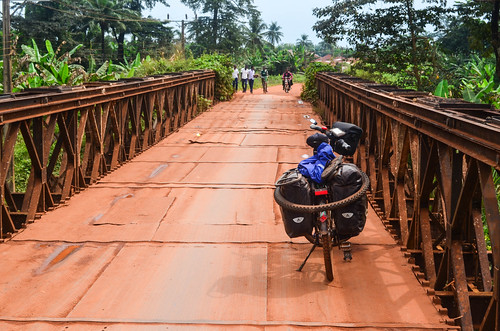
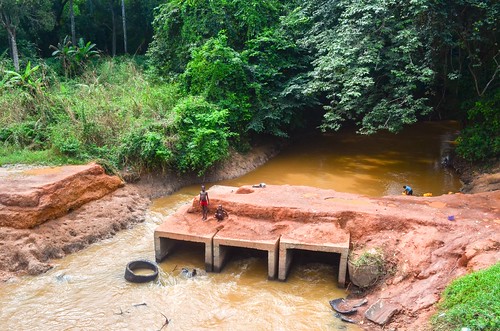
I take a rest on this quiet road behind a church. It is a church halfway between the nice ones, hosted in huge buildings made of bricks, and the hut-like churches, that don’t look different from a stall of banana sellers.

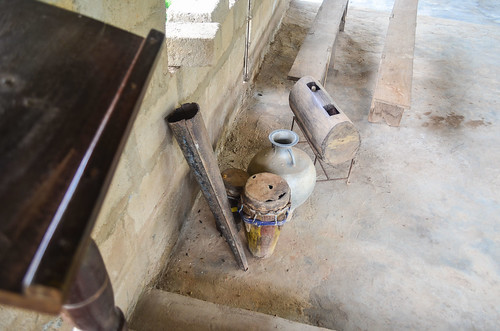
When I reach a bridge down into the river it is supposed to cross, I understand why was the road so quiet.
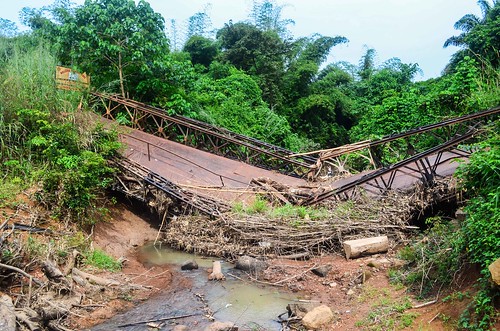
There is a makeshift solution for two-wheelers made of wood planks. It fits motorbikes and my bicycle, and that is why we are the only ones on this 50-kilometer stretch of the road.

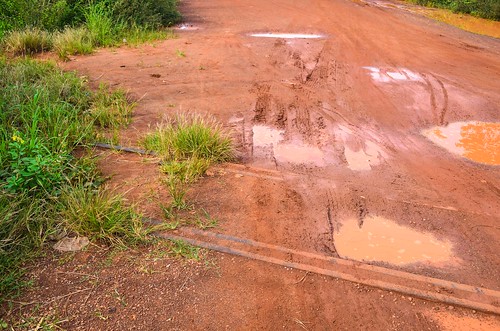
I reach the main road again in Nkalagu. There is no hotel here, so I am good for going even further, even if I have made 100 kilometers already. The quality of the road is very bad for a major road link and the checkpoints make their come-back. Out of three, two are very talkative and it doesn’t arrange my plan to speed to a hotel before night.
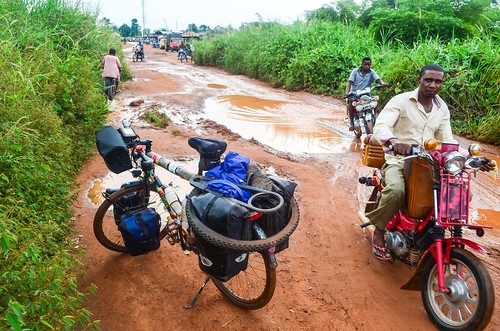
The first checkpoint is rougher than usual. The officer with a rifle is shouting at me from afar: “You! Stop here. No, there. Get off your bike … Park here. Now open the luggage. No, I am not coming closer to see, open and show me from there!“, like if I was carrying a bomb.
Opening all of my luggage would definitely take long enough for the night to catch up with me at the checkpoint, but fortunately, the police boss intervenes and replaces the luggage inspection with a relaxed chat and questions. The chat ends with “So now we are friends, what do you have for me?“. “Well, here’s my card so we can keep in touch“. I also take some purewater (the sachet water bags) to make up for the 10 minutes loss and go on.
Shortly after, another MOPOL checkpoint. MOPOL is the mobile police, and they are everywhere. This one is more fun and the men request pictures.
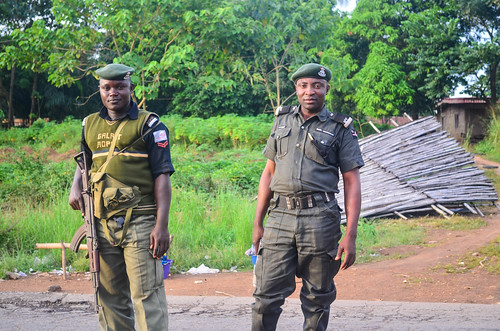
In the end, I can’t reach Abakaliki, but there is a quiet place for cheap some 15 kilometers ahead, in Ezzangbo. The place is popular for its donkey market: live donkeys in the middle of the village for sale (for their meat). Unfortunately, I can’t eat donkey meat here because the food stalls don’t grill them. It is improper food for the Muslims who live around, so one can only buy the raw meat (or animal).
The first checkpoint of the next day awaits me even before I get on the bike, just in front of the guesthouse, across the road. They are many on the road between Enugu and Abakaliki, the capital city of Ebonyi state. I didn’t see any for the last days, probably because I was only on secondary roads.
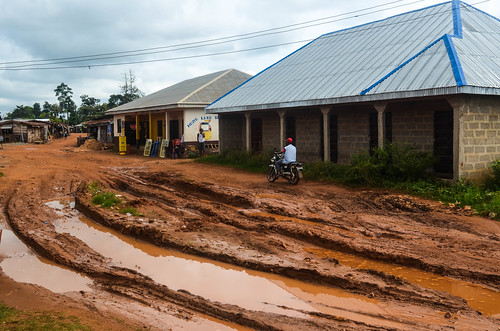
At one army checkpoint, one soldier is chatting to me while another is in underwear, on the road, taking pictures of me with his phone. They are friendly, so I highlight that it is ridiculous for army men in underwear to snap pictures of tourists on the highway. “He was washing stuff there, that’s why …” … yes, maybe, but it is still far from the image of an army that is supposed to be fighting Boko Haram.
From Abakaliki, I turn right to head straight to Calabar, it will take two more days. Sometimes Nigeria could be mistaken for India, with its rickshaws and colorful trucks displaying all kind of religious, or less religious, messages.
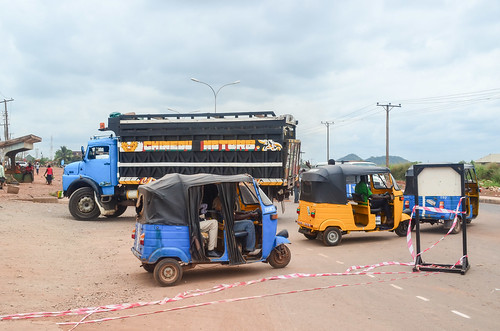

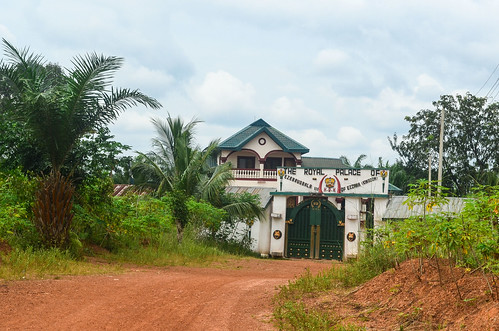
At my Coca-Cola stop in Ezza South, I chat with the owner of the small shop. He has to leave as someone in the community got murdered nearby, this very same morning. “There was a fight, someone got injured, and died …” as simple as that.
After Ebonyi, I enter my last state of the Nigerian crossing: Cross River. It is very green all around, and fortunately there is a new bridge to cross the Cross river.
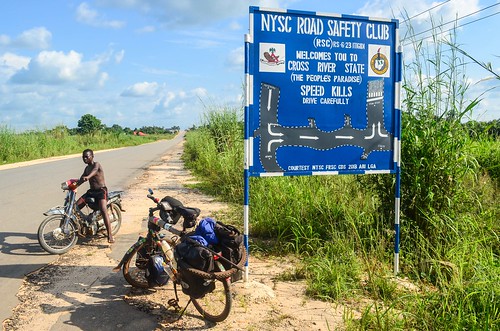
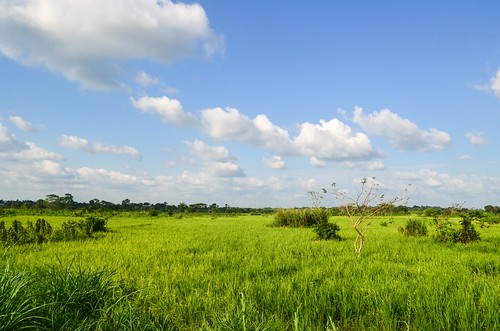
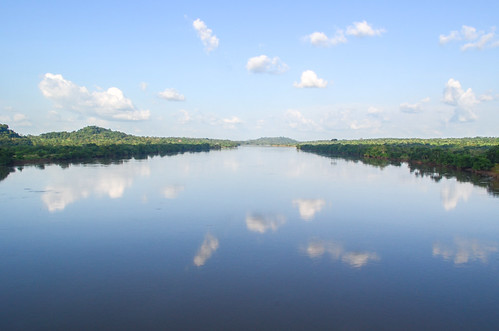
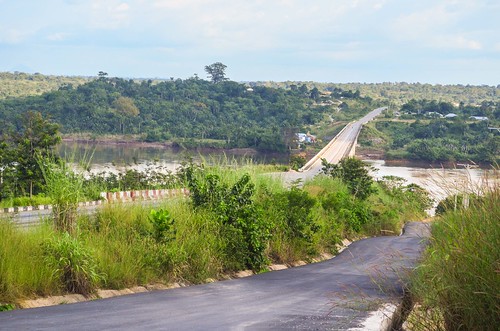
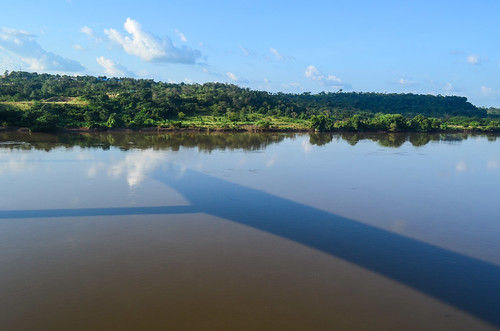
My day ends in Ugep, the first day under 100 km in a while. I have returned to my habit of checking in the cheapest place, for 1500 naira instead of 5000. I share a beer with federal workers. They lived and worked in the North, where the majority is Muslim. There, you can only have a beer at the army barracks, and Muslims must drink hidden.
The rain comes while eating and a lightning strikes the table carrying a hundred sockets. This is the phone charging business, working when, by lack of electricity, people have to share a generator to charge their phones. It creates a giant sparkle just outside the restaurant while the thunder cover our voices. “This is the rainy season saying bye-bye“, they say. Overall, the rainy season didn’t bother me much. The worst was in Sierra Leone with flooded roads and hours spent waiting for the violent rain to stop. Apart from that country, my days riding went fine. Maybe it was even better to ride mostly under a cloudy sky, because when the sun shines, I turn really red.
The road from Ugep is rather quiet and very green. I see many bush meat stalls. Bush meat is mostly grass-cutter (the agouti I had eaten in Ivory Coast), but it can be rat, porcupine, … anything captured in the fields with meat on the bones.
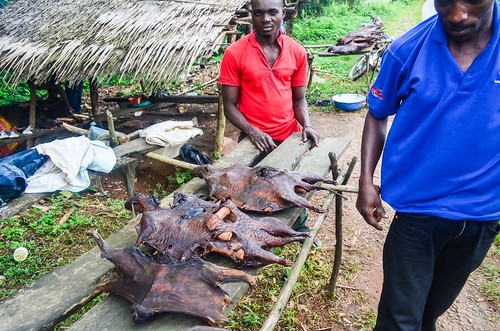
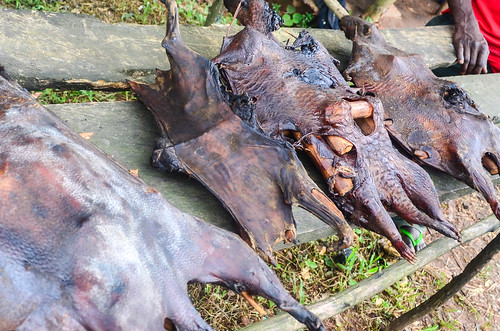
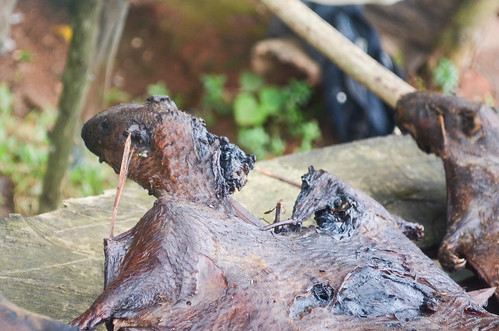
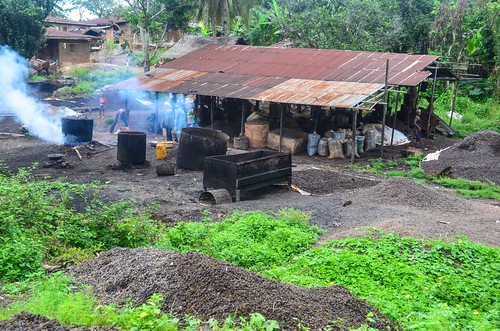
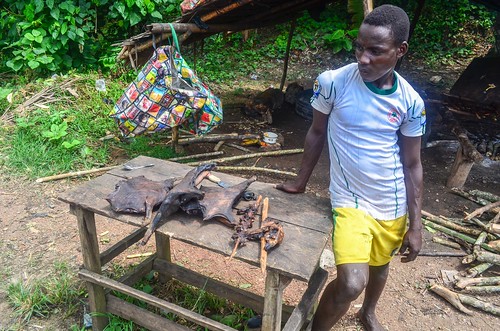
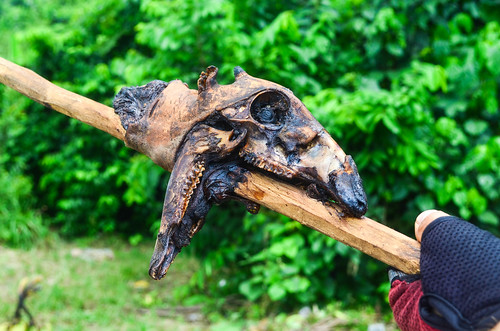
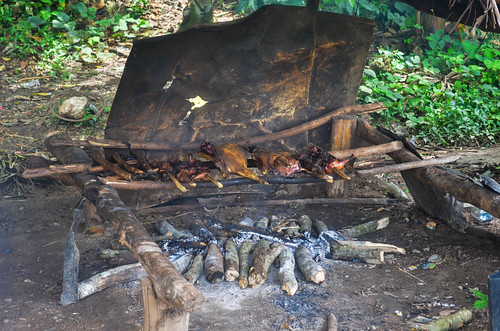
The fun with bush meat is that you never know what you are eating. Even when asking, the name given to the meat may not be the name of the animal. It is then easier to have a busy mind while eating: “Are they really bones like this in a chicken? Hmmm … strange, but I’m hungry and it tastes good.”
I don’t know what to say about the most striking feature of this road to Calabar: the deforestation of most of the landscape for planting palm trees (palm oil business) or the incredible collection of car wrecks parked on the roadside. There are more car wrecks than anywhere else, it is more than one per kilometer. And the vehicles are seriously damaged.
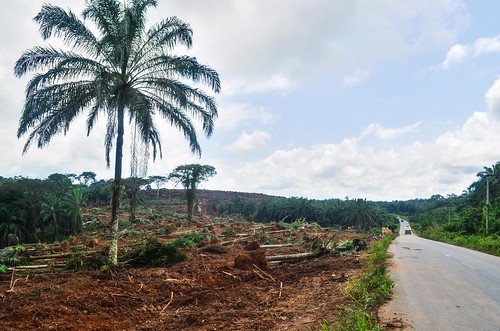
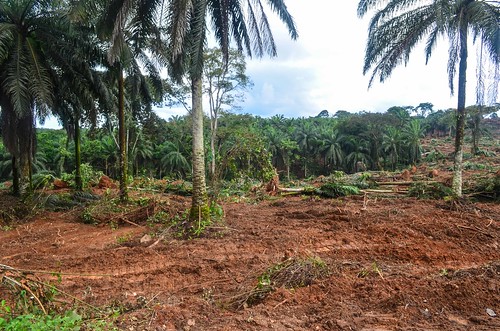
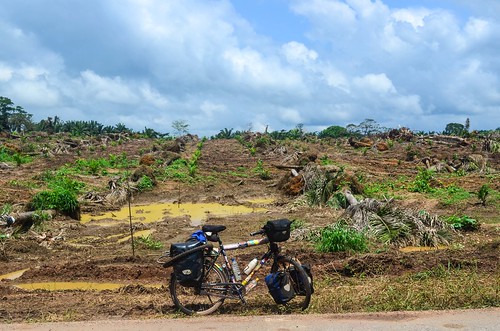
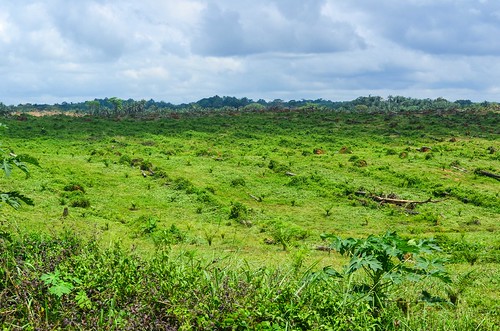
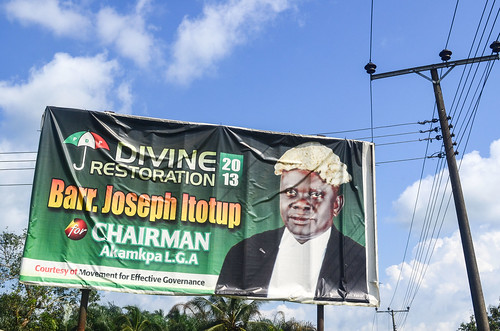
The cars are speeding indeed, and the last 30 kilometers until this dead-end town, on the banks of the Calabar river, in the mini-delta of the Cross river, are very dangerous. Many cars pass very close to me, way too close. There are lots of trucks too. It is the most dangerous road I have been cycling so far.
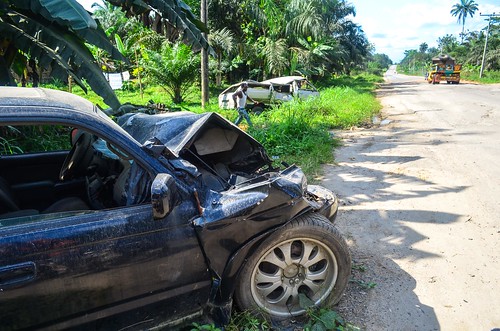
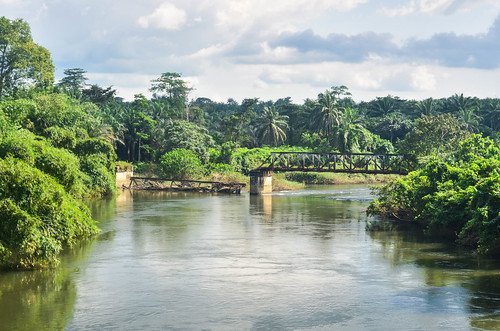
I am relieved when I reach Calabar town. On my right are the Nollywood Tinapa studios, but the city center is still further. I can’t just stop two minutes by the main road to check my maps before people come and ask for something. There are even people with masks and dressed in branches, probably representing spirits or so, standing in front of me until I give something, or go.
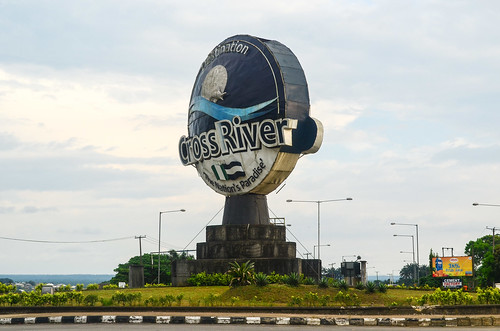
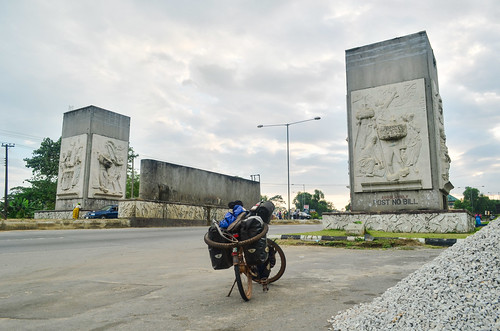
I go straight into Calabar to identify the Cameroon consulate. It is not easy to find, and actually at the end of Spring road. I am helped by a policeman who finds a decently priced guesthouse for me and takes me to the consulate. Despite all what we can hear about the Nigerian police, I find them the most helpful of West Africa.
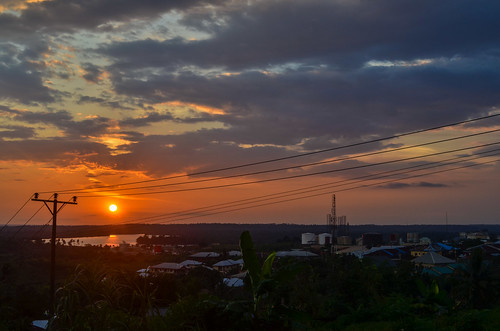
The visa procedure for Cameroon is the easiest so far: 3 pictures, 18000 naira, and the application form. Nothing more. The staff of the Consulate is friendly and the visa issued within 2 hours, probably less if I hadn’t shown up that early. I read the newspaper while waiting. It reads that off the Calabar coast, a wooden boat, made of planks, just capsized. It carried 120 people migrating to Gabon, taking an unusual route as the people, from francophone West Africa, are thought to be immigrating illegally. There were only two survivors.
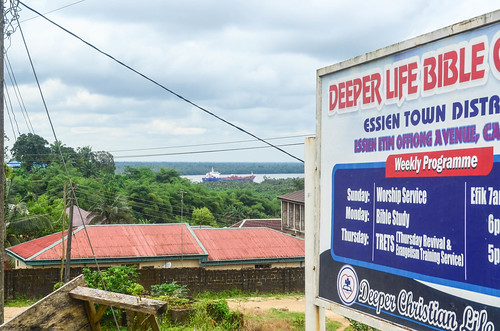
The city is very green as the mayor has said that every citizen must plant a tree. It is also a delicate area, as it is full of mangroves, oil pipelines, and bad people with weapons trying to get a better life.
From Calabar, I have two options: cycling north on the same road to pass the border in Ikom and Ekok, a border post said to be impossible during the rainy season (and it is still raining a lot at night), or the ferry until Limbe, Cameroon. I choose the second option. So I cycle to the port to get my ticket for the ferry departing the next morning. There are only 2 services a week between Calabar and Limbe, by the Cameroonian company Fakoship.
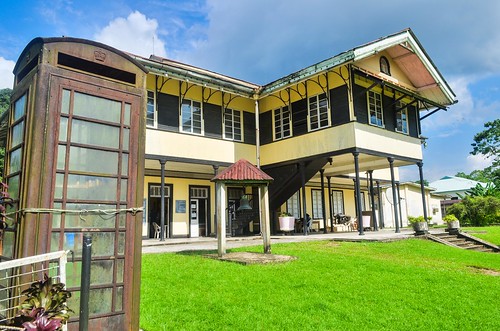
In the meantime, the museum of Calabar is interesting. It is half dark because many lights are not working, and the ones that work are poorly lit by the insufficient power of NEPA. It details, seemingly as all the museums of West Africa, the slave trade of the region. From 1690 to 1807, the year slave trade has been declared illegal by England (because it was no more profitable for them during the industrial revolution), it reads that 30% of the slaves shipped to the Americas came from Biafra (present-day Nigeria), 20% from the Gold Coast (present-day Ghana), 20% from Angola and Mozambique, and only 5% from Senegambia.
They were 30’000 slaves shipped annually during those years, up to 130’000 a year at its peak in 1830, when England were chasing slave ships in the Gulf of Guinea. The slave trade has always been profitable to the local rulers, who could get stronger in their region, and get paid for getting rid of their prisoners and unwanted tribes. The currency in which the local chiefs were paid is also exhibited: simple steel rods, shells and steel rings. And alcohol and fabric of course.
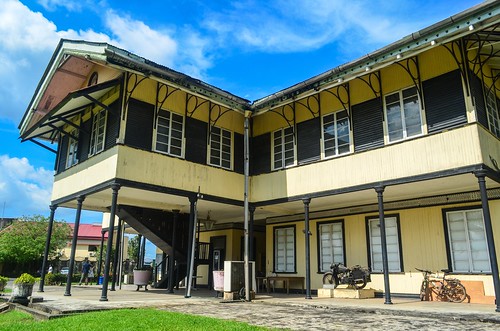
When the slave trade decreased, the main commodity traded switched to palm oil. I think I have understood that England paid the local chiefs and middlemen a financial substitution for stopping the slave trade, their only source of (comfortable) income … The more I visit slave trade museums, the more Africa seems at least as shameful for the trans-Atlantic slave trade as Europe does. The entire area of the Niger delta, called Oil Rivers (at that time palm oil, but it still applies today with the crude oil), was producing palm oil. Nigeria was the main source of palm oil for England.
Calabar is today the 20th Nigerian city, but it was the capital of the British colony. Most of the country exploration was done through the rivers, by ships going upstream from their coastal base. The division of the country was made according to the rivers pouring into the ocean. The coast was nicknamed the “White man’s grave” as the Europeans could only (try to) survive to all the tropical diseases by staying away from the jungle.
Besides having its significant historical heritage, the city speaks Efik, there is a popular carnival in December, the fish is delicious and the people seems very friendly. I would say it is a good place to be.
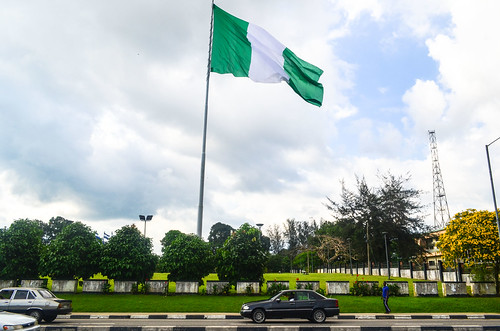
There is a small rain in the afternoon, lasting no more than 20 minutes, but it is enough to flood the roads and make people stride and jump over the gutters transformed into rivers.
On the day of the departure of the ferry, my alarm is set up to drop me at 6 am at the pier. The departure is set at 8 am. There are the secret services, immigration and yellow fever check to go though beforehand, and each of them has an office at the pier that run things quickly.
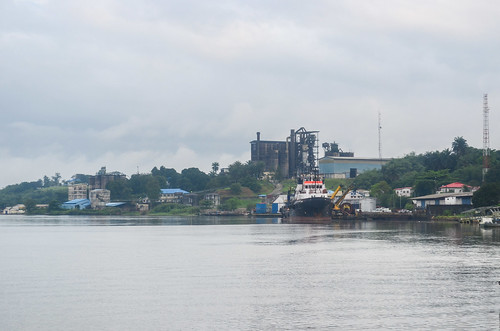
The ferry should take approximately 5 hours to cover the 150 km between Calabar and Limbe in Cameroon. I have a heavy breakfast just in case, and am ready to load my luggage in the boat. The Fakoship boat, called Endurance, doesn’t look like a strong and slow ferry but more like the bateau-mouches on the Seine river in Paris. All seats are indoors, air-conditioned, and there is no deck. A sign inside says it was built in 1995 in Singapore, and it looks pretty good.
The crew at the entrance team together against me to ascertain that I am not allowed to load my luggage myself into the ship. The loading is about 15-meter long: go onto the ramp until the ship entrance, turn left and drop your things at the back of the boat. My luggage is my bike so I am not letting anyone else, especially the careless helper boys, manipulating it. Since they insist that I use their services, and having a few nairas left in my pocket, I offer to pay them just to supervise me loading the bike in the boat.

That is a good deal, agreed on both side, as we both get what we wanted: nobody else touching my bike, and money for him. But the boy refuses to take my money (which was already more than what he would get from a local), doesn’t even leave his seat, and wants 4 times more. So I just push the bike myself inside the boat. It takes 30 seconds.
When I exit the boat, now the job is done, the boy comes back to me and axe for the money I had initially offered. That illustrates completely the shameless thinking around providing a service and making money, and it can happen in many other cases: people seriously requesting money to basically do nothing.
After all, I thought there would be a real fee for large luggage, but there isn’t. We all sit in the boat while the crew prepares meat pies and a hot drink for all the passengers. It is a rather nice service! But a lady is making a lot of trouble, shouting and making a huge scene. “I won’t go anywhere!“, she keeps shouting. Apparently, she was illegally in Nigeria and the big man from the immigration is not hesitating to brutally send her at the back of the boat. By the way, I have not seen any White for my whole stay in Nigeria, only Chinese (twice) and Indians (twice), presumably, since they are the only ones daring doing business in the tough conditions of Africa. Or maybe the only ones with good technical knowledge and no anti-corruption ethics. The Whites must be really well locked in their compounds in Lagos, even in the 4×4 I have not seen any.
I heard people saying, prior to coming to Nigeria, that it is a country different from Africa, and that is why it is so scary. Personally, I didn’t find it much different: it is the same, but 10 times more intense. More people, more traffic, more shouting, more police, more illogical situations, more money, more poor people … and much more attention onto the White man. It actually made me feel it was my first time in Africa, even after 15 countries visited.
People were also saying that the Nigerian police and military are the worst bandits of the country. I felt the opposite, they were in general friendly and courteous, and sometimes very helpful. They are better than in the neighboring countries (but I can only speak for me, not for locals or people in a shiny 4×4). Overall, if Nigeria manages to solve its ethnic conflicts and change its scary reputation, it could be the best experience in the region for travelers.
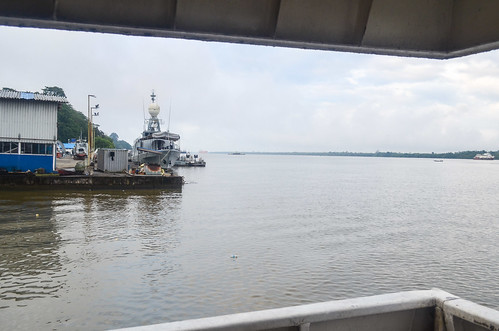
I thought the expulsion of the lady was the reason of our delay, but it is another one: the gunboat of the police, our escort in the Calabar river, didn’t show up yet. We need the escort until the Bakassi peninsula, which is still an area of dispute and marine piracy. The peninsula is inhabited by Nigerians but is owned by Cameroon since a recent decision of the International Court of Justice. It is 10 am and we are still at the pier.
I start to be scared when the captain takes the mic to fill up the relaxed atmosphere of the boat through the bad speakers: after the greetings, he starts a prayer. The TV screens were already playing pop songs praying the Lord, but it seems it was not enough.
After the prayer, the captain goes on with a song to Jesus. He is definitely not a singer, and the poor quality of the speakers doesn’t help him (it doesn’t help our ears either). Are we all going to die or what?
I start to feel bad when, from the second song onward, the majority of the boat passengers sing along. We are in a boat, without escort, about to sail into a dangerous area, and we are singing and thanking God for our lives … it doesn’t sound right at all.
I get distracted by the Nigerian movie that follows. We are moving very slowly in the Calabar river. My GPS says we move at 5 km/h when we should be doing a good 30 km/h. I actually got captivated by the 3-hour long movie, when I thought I would never be able to watch the bad quality Nollywood productions. Two princes, born on the same day from the two wives of a local king, best friends since their childhood, are now fighting over the same woman because their father wants them married in the year (and the secret is that the first one married gets to succeed to the king, so the mother becomes Queen Mother, so they secretly fight each other through their sons). The whole story happens recently enough for the princes to drive luxury cars. All the passengers of the ferry are also deep into the movie and comment it aloud like if it was a football game: “he should have done this!“, “wait, the girl will do that next!“. It is a very innocent and friendly atmosphere, but we are still going very slow.
We didn’t leave the Calabar river yet by 2 pm, when we should already be in Cameroon. The reason is that the police escort has only one gunboat, a speedboat with a machine gun in the front, for the two ships leaving Calabar today: us, and a very slow old boat with a broken engine. We had to stick together and cope with the engine breakdowns of the other boat.
Once out of the police escort range, we can turn on the engine fully and sail through the Gulf of Guinea. There is another captivating Nigerian drama, this time with a prince having to choose between three princesses (a modern story again), but I check out of the window for the oil platforms. We are very close to the Delta, in the oil fields, right where boats get hijacked and western oil crew kidnapped. If the mouth of the Calabar river is populated with fishermen at first, at deep sea it is a web of oil platforms. Each one burning its own flame. It is even more beautiful when it gets darker, with all those fires in the night, even if we are probably not allowed to navigate too close to them.
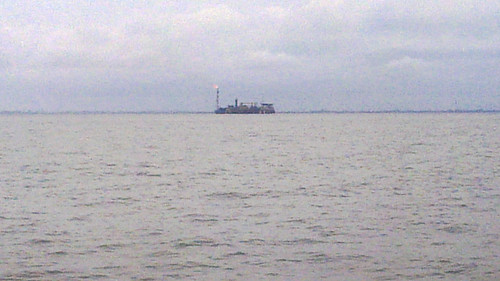
We also get a visit from the Nigerian marine police. Their speedboat comes next to our ferry, just by my window. They have a crew of 6, all carrying rifles and lots of ammunition, plus a big machine gun. I have no picture for obvious reasons … They are trying to stick with our ferry, and it is not easy with the speed. I guess they will come on board and inspect our ferry … but not at all: our ferry crew throws them a pack of 24 Guinness beers from a window. The policemen say thank you and bye-bye.
That was it for the dangerous waters. We turn around the Bakassi peninsula and can already see a huge shape ahead: this is Mount Cameroon, peaking at 4095 meter high, just near Limbe.
We finally arrive at 7 pm, at night. And worse, we don’t arrive in Limbe, but 15 kilometers before, in an industrial area. The immigration step is quick, and the ferry company has prepared buses to take the passengers into Limbe town. They want to put my bike in a truck and make me ride the passenger bus, but I convince them that I will be fine by myself with my GPS.
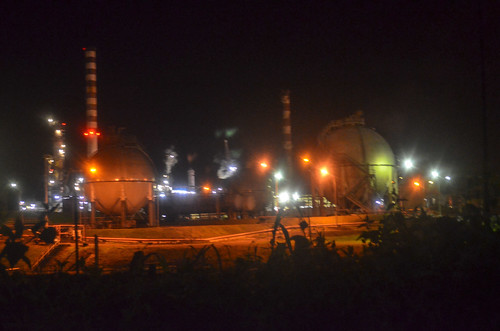
The trick is to get out of the pier: it is night, and the dirt track is going around fences, making a small path through big silos and cranes. There is even a structure looking like an offshore platform, but on the land. After Nigeria, I am no more scared of anything, and being disembarked at night in an industrial area, which is a worst case scenario for an arrival into a new country, seems part of the routine. I follow a car lights to find the secret path out, and then cycle the main road to Limbe. After almost 12 hours in the boat, I still have energy to go around the hotels, find the best deal, bargain, and go out for dinner.
Limbe is a new life: nobody comes to my face to shout at me that I’m white! I can walk freely in the streets! It feels like home. The downside is that the people are not that friendly.
Limbe’s streets in the small coast area are like a party every night. The bars play loud music and the freshest fishes are on the grills every 5 meters. You just walk, pick your fish for 2 € and it is served right away with miondo, yet another form of kassava. Delicious …







Hello,
Thanks a lot for putting this blog together. I am Ghanian-Nigerian and I plan on touring central and East Africa next year with my girlfriend. Our end point is Zanzibar and then we take a flight back.
Can you please provide insights on your trip from the Caliber port to the Limbe?
1. How much did the Fakoship ferry cost? In naira or dollar
2. At Limbe, what is the estimate of a cheap-decent accommodation?
Hi Kelvin,
The Fakoship costed me 10100 nairas.
I stayed in Limbe for 5000 CFA per night, it was slightly more confortable than what I’m used to. Accommodation is cheaper than in Nigeria, I’d say a cheap-decent room will required 5000 to 10’000 CFA.
Enjoy the trip! (and it may be worth checking ahead of time that the ferry runs and the border is open, as it’s not always the case)
please can some one tell me which place in calaba is this please
Hey just found this and have to say I’m super impressed! I’m nigerian from calabar, living in europe. I can’t imagine having the courage to do what you’ve done. Its amazing, thank you for this lovely post and I’m very pleased your experience in nigeria was okay. Stay safe!
Thanks for your comment!
Im so glad i found your blog.Im about to cross Nigeria by bicycle and i found your experiences so inspiring.Happy to see the other friendly face of this country that are not that usual.I enjoyed reading all your post from Nigeria with all your positive mood…and i might keep reading the next countries!
Hola Javier,
Yes, don’t believe the alarmist warnings you can hear as soon as you say “I’ll go to Nigeria”. They don’t know what they are talking about, and as you can imagine, there’s no reason for Nigeria to be completely different from the rest of the countries you’ve seen (and less tourists = friendlier locals, right?).
Be careful though, the usual risks are higher than elsewhere, the interactions are intense, and the situation has worsened over the past year. (See http://ilestlibremax.over-blog.com/2014/04/nigeria-tri-de-prejuges.html)
Dear Freewheely,
I am so impressed about your trip to calabar. Even though, i was born in calabar-i actually grew up in Lagos and now live in New York City.
I plan to visit calabar this year and i am sure that some of the information on Freewheely will help me navigate around the city.
Thank you.
Manny
NY
Thanks Manny!
I’m sure if you visit during carnival it will be super nice
jb
I found this to be such an enjoyable read that I felt compelled to comment. The narrative is so unassuming and frank, and it was nice to experience my country through your eyes. Great job!
Thanks Lou!